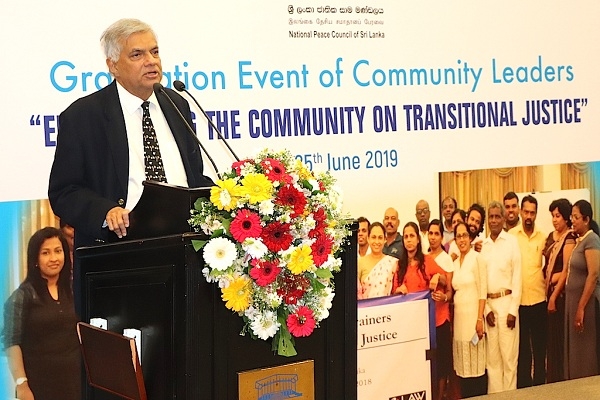Prime Minister Ranil Wickremesinghe stressed the importance of Transitional Justice (TJ) in Sri Lanka’s reconciliation process and pointed out that each country had its own unique course to follow. He praised NPC’s efforts towards furthering awareness of TJ and added that the government was taking steps to establish an inter faith reconciliation council made up of religious leaders.
“We have the strength and you have the strength to do it,” Mr Wickremesinghe said, referring to implementing the TJ process in the country.
The Prime Minister was addressing an event to showcase the positive outcomes of NPC’s project Technical Assistance to Justice Institutions, which is implemented in cooperation with Legal Action Worldwide (LAW). Project members, including religious leaders and community leaders, from Hambantota, Galle, Matara, Ratnapura, Kalutara, Badulla, Kurunegala, Anuradhapura, Kandy and Polonnaruwa attended the event in Colombo.
Mr Wickremesinghe added that each community, with its own experiences of war, had its own concerns about the way TJ would affect its interests. He stated that the new situation after the Easter Sunday’s violence should be approached systematically without leaving room for further extremism to breed.
The objective of the project is to enhance popular understanding and support for TJ concepts and processes in Sri Lanka across all ethnicities and religions through community-based information sessions, information material development and dissemination, and other media-driven strategies, in coordination with civil society and government partners.
Through the project, NPC was raising awareness about the importance of the TJ concept and addressing the most common misunderstandings surrounding it. The project has capacitated 35 master trainers, who in turn have taught the concept to more than 200 leaders of community-based organizations.
Speaker Karu Jayasuriya said that all major political parties should work together without politicizing efforts aimed at addressing post war issues, so that the problems would not be passed down to the next generation.
“While other countries have moved forward, we are lagging behind due to racial and ethnic violence. We all have a responsibility to look past ethnic differences and take the country towards success,” he said, while praising NPC’s work towards reconciliation in Sri Lanka.
NPC Chairman Joe William pointed out that it would be a mistake to think that past events would not have consequences. “Ethno religious intolerance, economic hardships, corruption, unemployment and feelings of injustice create conditions for renewed conflict, which could be reignited by even a minor disagreement,” he said.
Hambantota MP Mahinda Amaraweeera, Sarvodaya leader Dr. A.T. Ariyaratne, actor, Kamal Addararachchi, Rupavahini Chairperson Inoka Sathyangani and musician Ishaq Baig attended the event.
A document collating the master trainers’ recommendations for the effective implementation of TJ at grassroots level was handed over to Mr Wickremesinghe, Mr Jayasuriya and Mr Amaraweera.
The 35 master trainers compiled a list of recommendations based on their expertise gained through training and in conducting training and sharing their knowledge among community leaders. Responses and concerns of community leaders were included in the list to make implementation of the national Transitional Justice (TJ) process effective.
The group identified key barriers to TJ as being limited political commitment, circulation of misconceptions among the public, lack of understanding of TJ and lack of awareness of government efforts. The master trainers’ recommendations to overcome these barriers were categorised under the areas of criminal prosecution, reparation, institutional reforms, and establishing a truth commission.
Under criminal prosecution, the trainers’ recommendations included setting up of an independent court to adjudicate crimes committed during conflict period; government passing laws to set up the special court to ensure a legal framework for witness protection; and all members of judiciary on the special court to be given capacity development assistance.
Recommendations for reparation included expediting the establishment of the Office for Reparations; devising a programme for sustainable solutions and security for victims; establishing regional offices under the Office of Reparations; raising public awareness on the functions of the Office of Reparations; and obtaining assistance from civil society organizations.
Institutional reforms related recommendations included Constitutional reforms; reforms in the education sector; ensuring the presence of bi-lingual staff in key public service institutions; and media reforms.
In proposing the establishment of a truth-seeking commission, the group recommended that all commissioners should be well recognised by all communities; measures should be arranged to ensure that anyone could testify before the commission without hindrance; and a broad media campaign should be conducted to raise public awareness on the functions of the commission.
Among the general recommendations listed were raising public awareness on all steps initiated by the government for TJ; ensuring public participation and obtaining feedback; ensuring the participation of members of the opposition; and providing swift and firm answers when opposing ideologies are brought forward.

